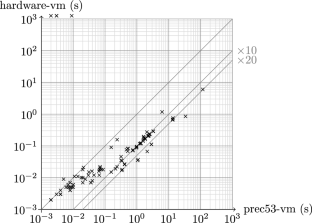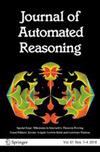在Coq证明助手中启用浮点算术
IF 0.9
3区 计算机科学
Q4 COMPUTER SCIENCE, ARTIFICIAL INTELLIGENCE
引用次数: 0
摘要
浮点运算是对实数进行近似计算的一种众所周知且极其有效的方法。虽然需要仔细考虑,但浮点数现在通常用于证明数学定理。数值计算也已应用于形式证明的上下文中,如CoqInterval库所示。但是这些计算并没有受益于现代处理器中强大的浮点单元,因为它们是在形式系统的逻辑中模拟的。本文尝试使用硬件浮点数进行由Coq证明助手验证的数字密集型证明。这就产生了关于形式化、实现、可用性和信任级别的各种问题。这种方法已经应用于CoqInterval和ValidSDP库,它们证明了至少一个数量级的加速。本文章由计算机程序翻译,如有差异,请以英文原文为准。

Enabling Floating-Point Arithmetic in the Coq Proof Assistant
Floating-point arithmetic is a well-known and extremely efficient way of performing approximate computations over the real numbers. Although it requires some careful considerations, floating-point numbers are nowadays routinely used to prove mathematical theorems. Numerical computations have been applied in the context of formal proofs too, as illustrated by the CoqInterval library. But these computations do not benefit from the powerful floating-point units available in modern processors, since they are emulated inside the logic of the formal system. This paper experiments with the use of hardware floating-point numbers for numerically intensive proofs verified by the Coq proof assistant. This gives rise to various questions regarding the formalization, the implementation, the usability, and the level of trust. This approach has been applied to the CoqInterval and ValidSDP libraries, which demonstrates a speedup of at least one order of magnitude.
求助全文
通过发布文献求助,成功后即可免费获取论文全文。
去求助
来源期刊

Journal of Automated Reasoning
工程技术-计算机:人工智能
CiteScore
3.60
自引率
9.10%
发文量
31
审稿时长
>12 weeks
期刊介绍:
The Journal of Automated Reasoning is an interdisciplinary journal that maintains a balance between theory, implementation and application. The spectrum of material published ranges from the presentation of a new inference rule with proof of its logical properties to a detailed account of a computer program designed to solve various problems in industry. The main fields covered are automated theorem proving, logic programming, expert systems, program synthesis and validation, artificial intelligence, computational logic, robotics, and various industrial applications. The papers share the common feature of focusing on several aspects of automated reasoning, a field whose objective is the design and implementation of a computer program that serves as an assistant in solving problems and in answering questions that require reasoning.
The Journal of Automated Reasoning provides a forum and a means for exchanging information for those interested purely in theory, those interested primarily in implementation, and those interested in specific research and industrial applications.
 求助内容:
求助内容: 应助结果提醒方式:
应助结果提醒方式:


